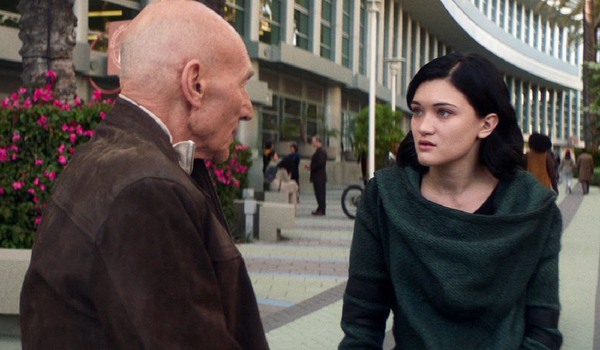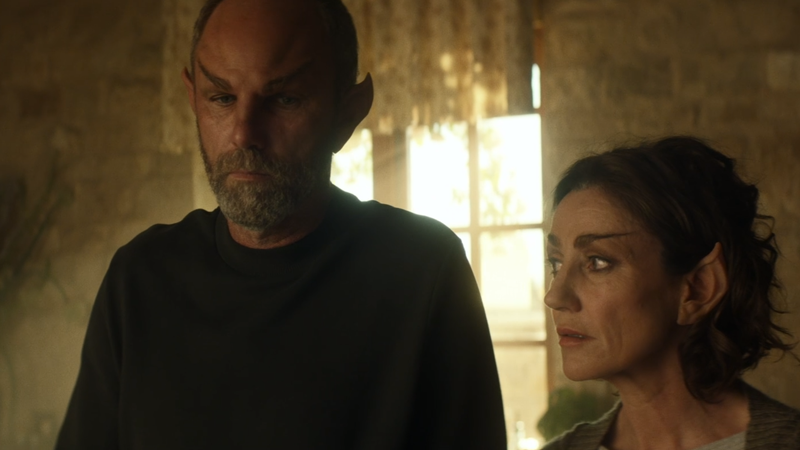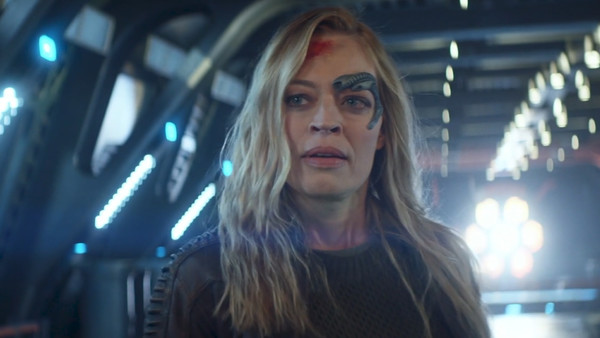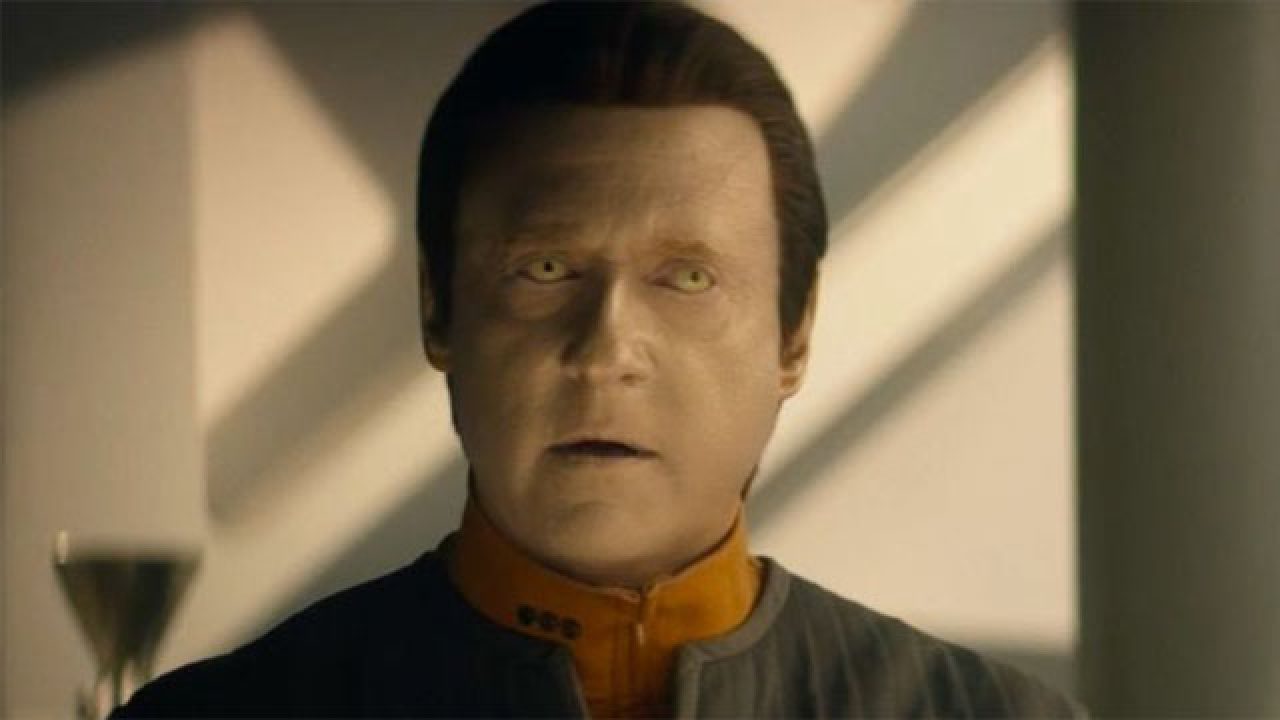The following is a guest post by Aren K. Hatch.
Once again, new Trek graces our screens! The first season of Star Trek: Picard is now out on DVD and Blu-Ray. The three-disc set is replete with special features ranging from deleted scenes and gag reels, to deep-dive looks into the formation of the show and many of its outstanding technical aspects, including its jaw-dropping production design.
Twenty years after Star Trek: Nemesis, we find Patrick Stewart’s Picard settled into Chateau Picard with his faithful pitbull Number One. Picard has retired into the quiet winemaking business, not simply because age has gotten to him, but because Starfleet, and by extension the Federation, has changed since we last saw it. They have abandoned the Romulans after the destruction of their homeworld, a decision Picard could not abide.
His drive to help is reignited upon meeting Dahj (Isa Briones), a woman with powerful abilities hunted by a clandestine groupㅡand connected to his lost friend Data (Brent Spiner). When Dahj dies before Picard is able to discover the full truth, he enlists the help of his old friend Raffi (Michelle Hurd), ex-Starfleet captain Rios (Santiago Cabrera), and cyberneticist Dr. Jurati (Alison Pill) to locate Dahj’s twin sister Soji and Dr. Bruce Maddox (John Ales), who might hold the answers to Dahj and Soji’s existence.

Along the way, the group is joined by Elnor (Evan Evagora), a Romulan swordsman who grew up listening to stories from Picard during his time assisting Romulan refugees. They also run into a face familiar to viewers of Star Trek: Voyager: ex-Borg Seven of Nine, who has made a life for herself among peacekeeping vigilantes called the Fenris Rangers.
The journey is not so simple, as Picard faces betrayal, skirmishes with Tal Shiar-like Romulans on a derelict Borg Cube, and a colony of androids bent on the destruction of all organic life.
Honoring old faces and new, Picard keeps to the guts of Star Trek and adds new, darker elements reflective of today’s world. Picard shines in exploring narratives of identity, trauma, fear, and xenophobia, ideas native to Star Trek.
Intertwining new elements with the old, the first episode teases an auspicious new experience. We witness an antagonistic reporter interview an impassioned Picard, his words perfectly encapsulating the soul of Star Trek. However, in every subsequent episode, the show loses itself in myriad scenes of exposition, one-dimensional motivations, and non-characters. In the end, what we’re given is a dark, death-heavy, flashback-riddled, and nonsensical story that may leave you feeling more bemused and disturbed than comforted and enlightened.
A Federation embroiled in isolationism and xenophobia hits close to home. After years of an idyllic, utopian society that embraced Infinite Diversity in Infinite Combinations, seeing it warped by fear is jarring but necessary. But how did the Federation get to this point, after being so united against a common foe in the Dominion War? In a society long since without money or scarcity, why is Raffi seemingly forced to live in a mobile home in the middle of the desert? This Federation reflects our current society, yes, but it feels off. Rather than overlaying today’s climate onto the existing Star Trek framework, Picard feels like our society now, just with advanced tech. It’s like any other generic sci-fi setting.

The people don’t fit right either. They talk exactly like us, not future people. They’re just as cruel and dramatic as we are. Picard often feels like Patrick Stewart, not Jean-Luc. Others, like Elnor, don’t seem to play any real purpose.
And that’s another disappointment in Picard: its violence. Today’s audiences are accustomed to fight scenes, and while that’s never been a focus in older Trek, it makes sense to include more in the modern era. The problem is how they include it. At its worst, it feels gratuitous and over the topㅡstylish death not in service to the story.
Picard brings back beloved characters (or infamously beloved, in Maddox’s case) to murder them. Hugh? Murdered for no reason. Icheb? Tortured and murdered. Maddox? Murdered by his ex-lover. The xBs we spent time with, in a lovely attempt to show a more “human” side of the Borg instead of blanket evil? Blown out into space.
One violent scene produces a brilliant moment where Picard feels like himself again, like a captain reprimanding his officers for un-Starfleet-like conduct. But the moment is undermined by what came before: the senseless beheading of Romulans who were provoked by Picard in an oddly prideful and uncouth move.
What’s the point of it all? Violence for the sake of violence. Drama for the sake of drama. It’s antithetical to Star Trek’s entire purpose.
And the characters, played by a devoted cast, suffer for it. Our three leads are too similar in disposition: grumpy ex-Starfleets hidden away from the world in recent years. Having one character like this is great, two is okay, but three is pushing it. It’s like a continuous, sad grumpfest.
The characters we’re meant to care about lack depth. It’s as if the writers picked out one trait and based entire characters around them, forgetting to add what turns characters into people.
That being said, Picard gifts us two intriguing characters with less screen time than they deserve: Laris and Zhaban (Orla Brady and Jamie McShane), two Romulans living and working on Chateau Picard. Even with the short time we spend with them, Laris and Zhaban captivate. They feel grounded, real.

As does Seven of Nine, arguably the most interesting character on the show. Jeri Ryan kills this part, even with as little screen time as she gets. She’s recognizably the Seven we know, but time and events have changed her. She’s more human than before and dealing with new trauma in addition to her Borg past. She’s a mix of old Trek and new: maternal and comforting, someone who’s good at heart and holds close to her personal ideals; yet also rougher around the edges and willing to take a stand against evil, even if it’s not in ways the Federation condones. Her little moments with Picard shine, one exchange in particular highlighting their shared trauma:
Seven: After they brought you back from your time in the Collective, did you honestly feel that you regained your humanity?
Picard: Yes.
Seven: All of it?
Picard: No. But we’re both working on it, aren’t we?
Seven: Every damn day of my life.
The most important character focus of the show, however, is one Patrick Stewart advocated for most: closure with Data. Nemesis never really gave us a true ending for our cherished android, and Picard finally delivers what fans have been craving. It’s a bittersweet but satisfying goodbye, especially since we get to experience the process of letting go and moving on with Picard.

Along with the focus on Data, Stewart also insisted on earned references only: a refreshing idea in a world full of sequels and franchises hellbent on neverending references. Stewart wanted the show to stand on its own two feet, and it assuredly does. One of the sweetest references comes in the form of Picard’s gentle and beautiful theme song, with notes echoing to us from The Next Generation’s “The Inner Light.”
Picard offers many other delicious details in its production design and worldbuilding, most notably in its depiction of post-supernova Romulan culture. We see not just the spies, military, and epic shoulder pads we’re used to, but Romulans being Romulans. Sects like Qowat Milat, assassin nuns. Civilians shopping at food markets. Romulans drinking and playing a board game–one which has an entire established ruleset. We even get to see triangular Romulan tarot cards! Romulans with and without forehead ridges! Geometrically inspired Romulan plushies!
Some may call Trekkies like this reviewer grumpy and old school, and maybe they’re a little right. But even as shows evolve, they should retain their essenceㅡwhat makes Star Trek Star Trek is more than just characters and setting. Picard strays from that in favor of flashy effects, ingenuine drama, and senseless violence. In the end, however, everyone should give Picard a try if they’re interested in Star Trek or sci-fi. Star Trek is always worth a watch, especially when it’s Jean-Luc Picard at the helm.